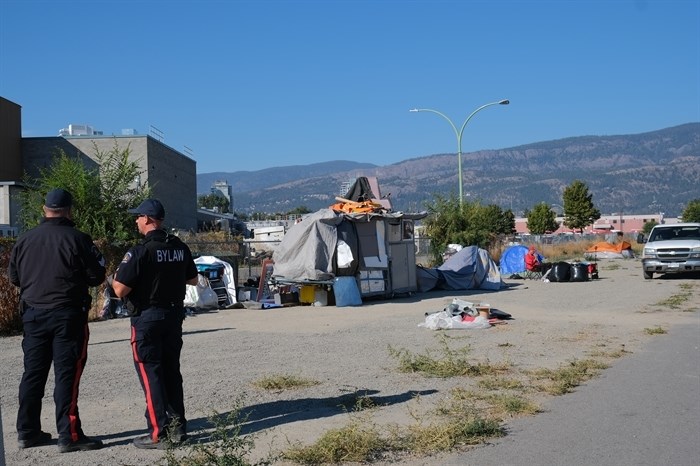
Police and bylaw officers at the homeless camp along the Okanagan Rail Trail in Kelowna, Sept. 26, 2022.
(CARLI BERRY / iNFOnews.ca)
November 12, 2022 - 6:59 AM
Downloading from senior governments is a major reason why there’s major homelessness problems in cities like Kamloops and Kelowna.
It’s also a reason why property taxes have continually gone up, according to a 2014 report on the subject.
“Billions of dollars in federal cuts in transfer payments to provinces occurred in the mid-1990s,” the report published by the Columbian Institute says. “Cities didn’t even see the devolution coming until people started to build shelters in their parks. Provinces inherited the federal money. Cities inherited the problem.”
In terms of building essential municipal infrastructure like roads, sewers and water plants, the federal government covered 34% of those costs in 1955.
By the time the report was written it had dropped to 13% in B.C. while local governments’ share grew from 27% to 48%.
Between 2001 and 2010, local governments’ spending on sewer services grew by 173%, policing by 134%, water services by 130% and parks, recreation and culture costs were up 108%.
The report, called ‘Who’s Picking Up the Tab? Federal and Provincial Downloading onto Local Governments’ included then-Kelowna Mayor Sharon Shepherd as a member of its advisory committee and had input from cities, towns and regional districts throughout the province.
While it’s dated, when it comes to many of the issues that were raised in this year’s municipal election - especially homelessness and housing - it clearly shows the genesis of the mess cities find themselves in today.
“The federal government withdrew entirely from new housing in 1993 and provincial construction in B.C. dropped off from 2001 to 2005,” the report says. “Using B.C. as an example, new social housing units since 2006 have increased by an average of 418 units per year — quite a drop from the 1,000 to 1,500 per year in the 1970s.”
It talks about the huge impacts of senior government cutbacks on social supports and housing.
READ MORE: HOUSING CRISIS: Kamloops mom and kids in rough place after losing home
“Social service cutbacks from other orders of government are showing up as social problems and service gaps which strain other services,” the report says. “Inadequate community support for people displaced from institutional settings, below-poverty level disability assistance rates (frozen in B.C. since 2007), homelessness (not a significant factor until the mid-1980s when the deepest federal cuts were enacted) and reduced general hospital psychiatric capacities are taking their toll on local communities.”
From 2008 to 2013 the Prince George RCMP detachment saw a 40% increase in mental health related calls. The Vancouver Police Department estimated that 21% of incidents it handled in 2014 were related to mental illness.
“Policing costs resulting from provincial and federal failures to address mental health and housing for communities across B.C. likely range between $50 and $150 million per year,” the report – written in 2014 – says.
At the same time, the rules were changing for things like sewer systems and water quality but the money to upgrade them was not included.
When the federal government implemented its Wastewater System Effluence Regulation in 2012 it suggested the cost for B.C. cities to comply would be $570 million. Metro Vancouver, alone, estimated its costs to be $1.5 to $1.7 billion.
But worse was yet to come, the report predicted.
“Climate change related extreme weather events, flooding, forest fires, droughts, heat waves and other hazards over the next century will lead to billions of dollars in costs to local infrastructure, and even the viability of some Canadian communities,” the report warned.
It listed five “solutions:”
-
Nothing be downloaded without funding
-
Provide stable revenue rather than grants
-
Establish a formal review process
-
Launch a major review of funding models
-
Consider constitutional rights of municipalities
Has anything changed as a result of the report?
Certainly not on the housing side or the funding model.
READ MORE: The Loop opens in Kamloops to protest homeless shelter delay
The B.C. Urban Mayor’s Caucus, representing the 13 largest cities in B.C. that included Kelowna’s former Mayor Colin Basran as its vice-chair, is still fighting some of these battles.
It’s Blueprint for B.C.’s Urban Future includes calls for action by either the federal or provincial governments, or both, to:
-
Accelerate investments in affordable, supportive and social housing
-
Establish a committee to create a new fiscal relationship
-
Increase complex care housing
The Union of Municipalities, just over a year ago, adopted a policy called ‘Ensuring Local Government Financial Resiliency: Today’s Recovery and Tomorrow’s New Economy.’
It calls for a review of the property tax system and to find ways to identify other revenue sources to “increase funding for attainable housing” and to reverse “historic downloading of jurisdictional responsibility” on housing, mental health and addiction services.
The Columbian Institute describes itself as an "independent public policy think tank based in B.C."
The full report can be found here.
To contact a reporter for this story, email Rob Munro or call 250-808-0143 or email the editor. You can also submit photos, videos or news tips to the newsroom and be entered to win a monthly prize draw.
We welcome your comments and opinions on our stories but play nice. We won't censor or delete comments unless they contain off-topic statements or links, unnecessary vulgarity, false facts, spam or obviously fake profiles. If you have any concerns about what you see in comments, email the editor in the link above.
News from © iNFOnews, 2022